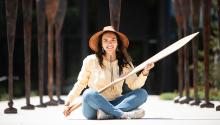Before coming to the UW, Masterman attended three community colleges, fitting in a course or two each quarter while holding down multiple jobs to support herself. After Green River College, she transferred to Highline College. Eager to learn Tlingit — the language of her people — she then enrolled in online courses for Tlingit through the University of Alaska Southeast.
When Masterman finally transferred to the UW, she tackled another language: Southern Lushootseed, the language of the Puget Sound’s Coast Salish tribes. “My people are from the north, so like many others, I’m a settler here,” she says of the Puget Sound region. “I felt an obligation to learn the language of this territory. And I really fell in love with the Lushootseed language.”
The UW’s Lushootseed courses, offered by the Department of American Indian Studies (AIS), led Masterman to major in AIS. But there was a time when she wasn’t sure AIS was the right choice. “When I got to the UW, I remember thinking, ‘I’m Native. Maybe AIS will just teach me things I already know. Maybe I should try something else.’”
A deep dive into Indigenous climate policy during her junior year helped change her mind. “I realized that climate science and climate policy involve so many things — education, culture, language, history, and community engagement,” says Masterman. “It’s all part of it. And that made me realize that American Indian Studies was definitely the right place for me.”
